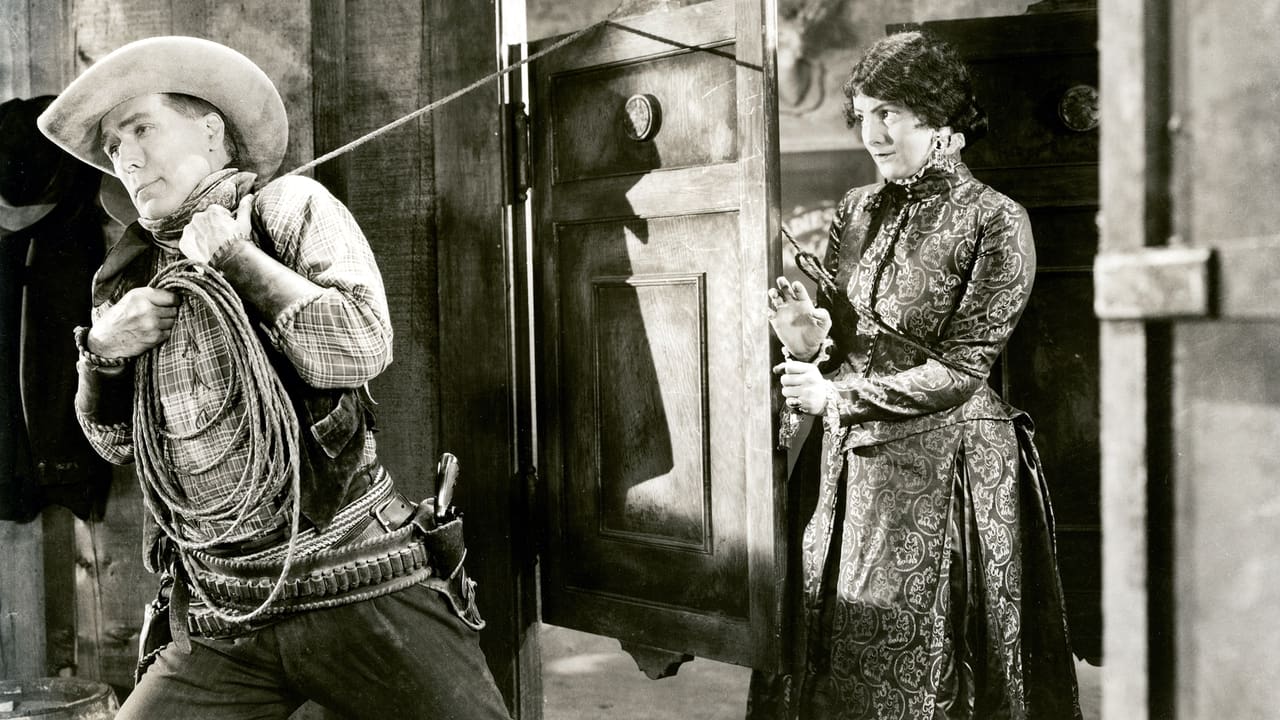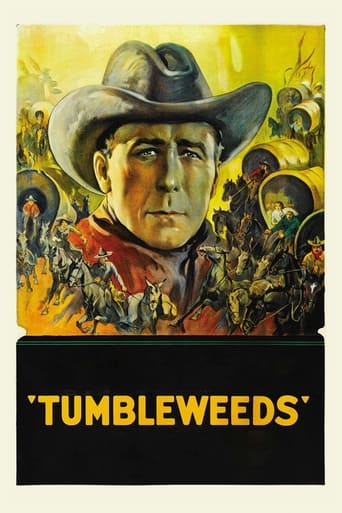

A brilliant film that helped define a genre
... View MoreThis is a tender, generous movie that likes its characters and presents them as real people, full of flaws and strengths.
... View MoreIn other words,this film is a surreal ride.
... View MoreThe movie's neither hopeful in contrived ways, nor hopeless in different contrived ways. Somehow it manages to be wonderful
... View MoreThe legendary William S. Hart's last film is a large scale homage to the passing days of the Old West, with star Hart portraying a grizzled veteran cowboy who sees the death of his lifestyle in the Oklahoma land rush and the last great cattle drives. It is often visually moving, but not very psychologically astute (nor perhaps does it attempt to be).Hart's character Don Carver falls for a young woman named Molly (Barbara Bedford) who has come west to try to make a land claim along with her older (J. Gordon Russell) and younger (Jack Murphy) brothers. Unbeknownst to her, the elder brother is making plans with a villainous criminal (Richard Neill) to take the best spot of land and leave Molly out in the cold. They frame Carver as a "sooner", so that he can't help Molly. But Carver escapes from his prison and rides at breakneck speed across the plains to try to win the land for his lady love.The scenes towards the end with the land rush are quite impressive in scale, and the fast riding Hart really impresses with his own stunt prowess. It's the very definition of a "set-peice" scene, basically a film version of one of the Wild West shows that used to be so popular at Expos and so forth (Buffallo Bill's show being the most famous). However I felt a bit let down by the actual fighting... the two bad guys didn't really fight Hart, they just ran away like cowards. I suppose that was the point, but it makes for a less exciting western when we don't get to see a good shoot-out.Hart's presence is excellent, but his actual performance is at times laughable. Never moreso than at the very conclusion of the film, when he wipes his brow and gives the camera a look of anguish that would have embarrassed even some of his Shakespearean brethren (Hart was a classically trained actor, and it shows). He's excellent in the early scenes when his presence is more stoic, but whenever the film asks him to show emotion he betrays it with showy affectations.I'm glad I saw it, if only as a history lesson in western film. The movie is not as goofy as a lot of the westerns from that time, but also not quite as self-serious as Ford's silents. It's a film that knows its place as a spectacle entertainment, and also manages to convey the sadness and majesty of the last days of the West.
... View MoreOnce it was among the most popular movies of its kind, and now it's generally remembered only by silent movie fans, but "Tumbleweeds" is a classic silent Western that's still worth seeing. To be sure, a lot of its appeal now comes from nostalgia, but in its time it was close to the top of its genre.The opening scenes start the story nicely, and they also give it some thoughtful overtones, with cowboys Hart and Lucien Littlefield coming to realize their role as "Tumbleweeds" in a changing world. The 'tumbleweed' image is used well in developing Hart's character, as he faces the consequences of the land rush and of the personal affairs he gets involved in. The story itself has a lot of familiar elements, without many surprises, but the atmosphere and the characters are enough to carry it.The land rush sequence is probably the most exciting part of the movie, and it is quite a fine set piece. It's later followed by a fast-paced climactic chase that also works well. The action makes a good complement to the atmosphere of the changing frontier, making it a movie that fits together nicely, and that still works pretty well.
... View More"Tumbleweeds" is a classic of the silent era. It marked the final film in the career of western movie pioneer William S. Hart. The plot revolves around the Cherokee Land Rush of 1889 Oklahoma where a large tract of land was thrown open to the public for the taking by the American government. Don Carver (Hart) and his pal Kentucky Rose (Lucien Littlefield) had been earning their living as "tumbleweeds", another name for drifting cowpokes. When the last roundup is completed, they decide to take part in the land rush. Carver meets up with the charming Molly Lassiter (Barbara Bedford) after having had an altercation with her half brother Noll (J. Gordon Russell). Noll teams up with Bill Freel (Richard R. Neill) to acquire a choice ranch section by any means necessary. Turns out that Carver has his sights set on the same ranch which he wants to get for Molly. The highlight of the film is of course, the land rush sequence. It is marvelously staged by Directors King Baggot and Hart himself. A cast of thousands was employed. A remarkable piece of film making for this or any other time. The version of the film that is usually shown these days is the 1939 re-issue which had sound effects added, as well as a moving prologue filmed especially for this version. It features Hart coming out of retirement and describing the film and then talking about his career and in effect saying goodbye to all of his fans. He had left films after "Tumbleweeds" following a dispute with the film's distributor. Hart had always insisted on realism in his films. This had worked in his early films but in the 20s, he had to compete with the more popular films of the flamboyant Tom Mix. He had reached his 60s by this time so he wisely decided to go out on top. Ohh...the thrill of it all!
... View MoreTumbleweeds has been said was the end of an era,maybe so in the silent sence.True it is that the westerns of Hart,Mix,Gibson,Anderson,Caray and others were over,but there styles were not. Western Stars that followed such as Tim McCoy,Tom Keene,Ken Maynard,Bill Boyd and others followed in the Tradition of Good over Bad.They lived by the Code of the West,they rarely drank,never drunk treated women with upmost respect,and use a gun only as a last resort .However the had a certain demeanor that when a scene ocurred they became part of the whole picture,not as a HOLLYWOOD STAR,but as a true cowboy who througt his actions was to become a HERO ,not because of his six-gun ,but because of his courage and honor. All these qualities what made William S. Hart the true heroic,but humble cowboy.That is why Tumbleweeds is a true classic in the way Hart faced with such obstacles never wavers ,even taking the time to help an elderly couple still after risking his life at every turn gives the claim to the young lady and her brother.Yes it was an end to an era,however it was the making of a true cinema Western classic.
... View More